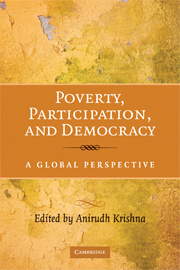Book contents
- Frontmatter
- Contents
- Preface
- Contributors
- Poverty, Participation, and Democracy
- 1 Introduction: Poor People and Democracy
- 2 Poor People and Democratic Citizenship in Africa
- 3 Do Poor People Care Less for Democracy? Testing Individual-Level Assumptions with Individual-Level Data from India
- 4 Inequality and Democracy in Latin America: Individual and Contextual Effects of Wealth on Political Participation
- 5 The Poor and the Viability of Democracy
- 6 Conclusion: Implications for Policy and Research
- Bibliography
- Index
3 - Do Poor People Care Less for Democracy? Testing Individual-Level Assumptions with Individual-Level Data from India
Published online by Cambridge University Press: 14 May 2010
- Frontmatter
- Contents
- Preface
- Contributors
- Poverty, Participation, and Democracy
- 1 Introduction: Poor People and Democracy
- 2 Poor People and Democratic Citizenship in Africa
- 3 Do Poor People Care Less for Democracy? Testing Individual-Level Assumptions with Individual-Level Data from India
- 4 Inequality and Democracy in Latin America: Individual and Contextual Effects of Wealth on Political Participation
- 5 The Poor and the Viability of Democracy
- 6 Conclusion: Implications for Policy and Research
- Bibliography
- Index
Summary
The positive effect of higher wealth on democracy was asserted by Lipset (1960: 31): “democracy is related to the state of economic development…the more well-to-do a nation, the greater the chances it will sustain democracy.” Later studies have overwhelmingly reaffirmed this association between wealth and democracy. However, why the association should hold remains unexplained in terms of micro-foundations. The causal mechanisms linking development to democracy “remain, in effect, a black box” (Rueschmeyer, Stephens, and Stephens 1992: 29); “there is little agreement as to why high income per capita…virtually guarantees that democracy will remain in place” (Bunce 2000: 707); the literature “suffers from ambiguities of its own” (Przeworski and Limongi 1993: 62); and it has “generated a long series of complex, competing, and largely untested hypotheses” (Remmer 1995: 107).
Alternative hypotheses were reviewed in the introductory chapter, suggesting that the missing causal mechanism is to be found in richer individuals' greater concern for democracy. As incomes grow, it is proposed, people tend to have more interest in and greater support for democracy. Three variants of this hypothesis have been put forward, although none has been tested empirically at the individual level.
A hierarchy-of-needs hypothesis provides the first clue as to why poor people might care less for democracy. A second clue was provided by hypotheses proposing value shifts and changes in culture. As people become richer, they are expected in this hypothesis, to acquire more of the values associated with respect for freedom and civil and political liberties.
- Type
- Chapter
- Information
- Poverty, Participation, and DemocracyA Global Perspective, pp. 65 - 93Publisher: Cambridge University PressPrint publication year: 2008
- 4
- Cited by



